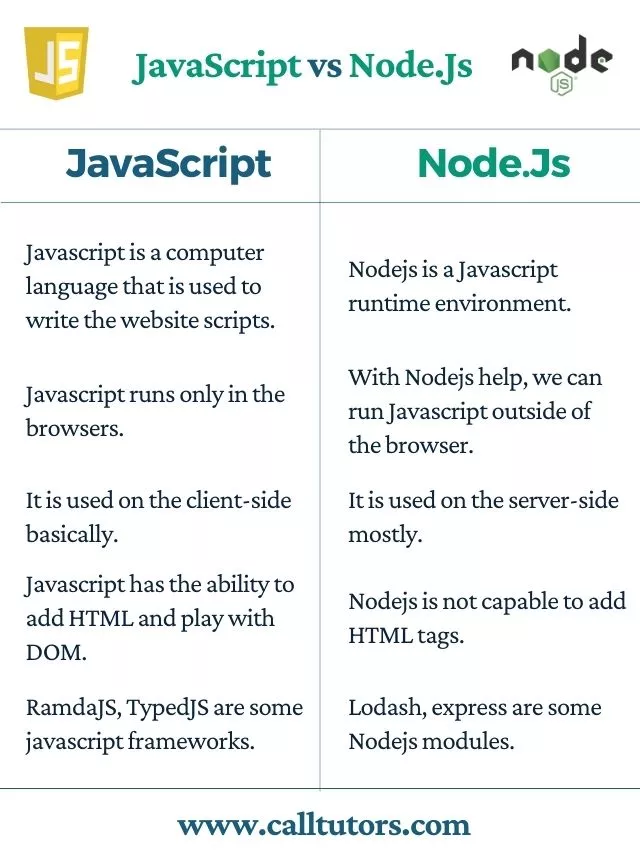Are you interested in knowing about some key differences between JavaScript vs Nodejs? If yes, then you are at the right place. JavaScript vs Nodejs is always a big concern among the students. Before going deeper, Let’s start with a short introduction to each of these terms.
Introduction To JavaScript
Table of Contents
Javascript is a lightweight object-oriented programming language for creating dynamic HTML pages with interactive effects. JavaScript is also widely utilised in the development of games and mobile apps. The code can only be executed and run in a web browser because it is an interpreted scripting language. To execute and run the code outside of the browser, we may utilise Node.js.
It’s also known as a browser’s language, and it’s capable of client-side and server-side programming. It was invented by Netscape’s Brendan Eich and was released in 1995. Before being renamed JavaScript, the language was known as LiveScript. The computer language C had a big effect on JavaScript’s syntax. The filename extension for JavaScript is .js.
Introduction To Node.js
Node.js is an open-source, cross-platform JavaScript runtime environment that allows you to run the JavaScript on the server. JavaScript code may now execute outside of the browser thanks to Node.js. Node.js has a vast number of modules and is mostly used for web development.
It may operate on a variety of operating systems, including Windows, Linux, and Mac OS. It provides a cross-platform runtime environment for developing extremely scalable server-side JavaScript applications with event-driven, non-blocking (asynchronous) I/O.
Ryan Dahl created as well as introduced the Node.js in 2009. Web apps, real-time chat apps, command-line apps, and REST API servers are just a few of the applications that may be built using Node.js. It is, however, mostly used to create network applications like web servers. Node.js’s normal filename extension is .js.
JavaScript vs Nodejs: The Key Differences
JavaScript vs Nodejs: Type
Javascript is a popular programming language that can be used in any web browser. In contrast, Node.js is a JavaScript interpreter and environment with certain special helpful libraries that may be used independently for JS programming.

JavaScript vs Nodejs: Utility
Javascript is mostly used for a web application for any client-side action, such as refreshing the page at a set interval, potential attribute validation, or providing any dynamic changes in web app pages without having to reload the page.
Some of the greatest IT organisations that provide software solutions utilise it to conduct or access any non-blocking operating system action, such as executing or writing a shell script, obtaining hardware-specific information, or running any backend process.
JavaScript vs Nodejs: Running Engine
JavaScript may run on any engine, including Safari’s JavaScript Core, FireFox’s Spider Monkey, and V8 (Google Chrome)
Node.js is only supported by the V8 engine, which is mostly utilised by Google Chrome. Furthermore, any JS programme developed using the Node.js library will always execute or run in the V8 Engine.
Some More Important Differences Of JavaScript vs Nodejs
- JavaScript is a basic programming language that can be used in any browser that has the JavaScript Engine installed. While Node JS is an interpreter or runtime environment for the JavaScript programming language, it requires libraries that can be readily accessible from JavaScript programming to make it more useful.
- For a single web application, JavaScript is often utilised for any client-side action. An activity might be dealing with business validation, dynamic page display at a set time period, or a simple Ajax call kind of task. For each online application, they are utilised for a maximum amount of time. In contrast, Nodejs is mostly used for accessing or executing any operating system in a non-blocking manner. On an operating system, a non-blocking action is one that involves creating or executing a shell script, retrieving specified hardware-related information in a single call, obtaining installed certificate data in the system, or performing a large number of defined tasks. To leverage the capabilities of Node.js effectively, businesses can hire node js developers who possess the expertise and experience to build scalable and efficient applications.
- JavaScript is a scripting language that adheres to the Java programming language standard. There may be some differences in the way code is written, but we can say that it adheres to the Java programming language standard. Whereas node JS is designed in C++ and provides a browser javascript runtime engine based on the V8 engine, it allows us to run a written javascript programme in any browser environment.
- Unique non-blocking job JavaScript includes several specific objects to access any operating system, however, they are all operating system specific. For e.g., ActiveX Control is a Windows-only application. However, Node JS is provided with the ability to conduct non-blocking operations related to the operating system from any JavaScript programming. There is no operating system specific constants in it. Node JS is well-versed in creating a particular coupling with the file system, allowing the developer to read and write to disc.
JavaScript vs Nodejs: In Tabular Form

| JavaScript | Nodejs |
| Javascript is a computer language that is used to write the website scripts. | Nodejs is a Javascript runtime environment. |
| Javascript runs only in the browsers. | With Nodejs help, we can run Javascript outside of the browser. |
| It is used on the client-side basically. | It is used on the server-side mostly. |
| Javascript has the ability to add HTML and play with DOM. | Nodejs is not capable to add HTML tags. |
| Javascript can run in any browser engine, such as Safari’s JS core and Firefox’s Spidermonkey. | Node’s Javascript engine is called V8. js which parses Javascript and executes it. |
| For frontend development, Javascript is used. | For server-side development, Nodejs is used. |
| RamdaJS, TypedJS are some javascript frameworks. | Lodash, express are some Nodejs modules. |
| It is the ECMA upgraded version and it uses the Chrome V8 engine written in C++. | It is written in C, C++, and Javascript. |
Advantages and Disadvantages of JavaScript vs Nodejs
Advantages and Disadvantages of JavaScript
| Advantages | Disadvantages |
Advantages and Disadvantages of Nodejs
| Advantages | Disadvantages |
Conclusion: JavaScript vs Nodejs
In this blog, we have discussed JavaScript vs Nodejs. And, for the students to understand the essential differences between the terms JavaScript vs Nodejs is very helpful. But if in any case, you need assistance regarding Javascript Assignment Help then feel free to contact us. We are always available to help you.
FAQs Related To JavaScript vs Nodejs
Is node js just JavaScript?
Nodejs is a JavaScript runtime based on the V8 JavaScript engine seen in Chrome. Nodejs is lightweight and efficient because it employs an event-driven, non-blocking I/O model.
Is Node JS hard to learn?
You can learn Nodejs in a few days if you already have a good programming background and are familiar with JavaScript. It may take 2-6 weeks to learn Nodejs if you have decent development expertise but no understanding of JavaScript.



